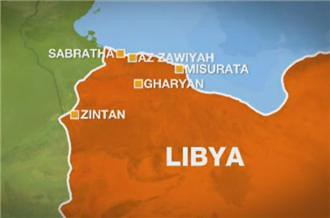
Areas in the North African state of Libya that are under threat by monarchists and CIA-financed counter-revolutionaries. Gaddafi addressed the country on March 2, 2011 saying the U.S. imperialists face a bloody war if they invade the country., a photo by Pan-African News Wire File Photos on Flickr.
Libya angers Tunisia as war briefly crosses border
7:33pm EDT
By Lin Noueihed and Tarek Amara
TRIPOLI/TUNIS (Reuters) - Libya's two-month civil war spilled over the border into Tunisia, provoking outrage in the western neighbor, while rebels in Misrata said only NATO could halt the bombardment of the besieged city.
The struggle between forces loyal to Libyan leader Muammar Gaddafi and rebels trying to end his more than four decades of rule drew in outsiders last month, as NATO began air strikes on government troops under a United Nations mandate.
But on Thursday the fighting spilled over Libya's land frontier, when Gaddafi troops battled rebels on Tunisian territory for control of the Dehiba-Wazin frontier crossing.
The incursion was brief and limited, and Gaddafi's troops even apologized locally. But the response was nevertheless furious from Tunisia, where the Arab world's wave of uprisings began late last year, leading to the overthrow of President Zine al-Abidine Ben Ali in January.
"Given the gravity of what has happened ... the Tunisian authorities have informed the Libyans of their extreme indignation and demand measures to put an immediate stop to these violations," a Tunisian Foreign Ministry statement said.
Illustrating the difficulty of keeping the Libyan conflict sealed within the country's land borders, artillery shells fired by Gaddafi forces also struck the Tunisian side of the crossing.
Rebels seized the post a week ago, as it controls the only road link which their comrades in Libya's Western Mountains have with the outside world, making them rely otherwise on rough tracks for supplies of food, fuel and medicine.
After weeks of advances and retreats by rebel and government forces along the Mediterranean coast, fighting has settled into a pattern of clashes and skirmishes.
Thursday's battle for the crossing between Dehiba in Tunisia and Wazin on the Libyan side was typical of the fluid and confused conflict, which broke out in mid-February.
First government troops stormed the post in what appeared to be part of a broader offensive to root out rebel outposts beyond their eastern heartland around Benghazi, Libya's second city.
Gaddafi's soldiers apologized to their Tunisian counterparts for the incursion and hoisted their flag at the border, tearing down a pre-Gaddafi era flag that had fluttered for a few days.
But then the rebels, who had retreated into Tunisia, counter-attacked and as the fog of war descended, rumors spread that the post was back in their hands.
In the confusion, scores of vehicles headed for the border from the Tunisian side with civilians on board shouting "We've won! We've won!" but they swiftly turned back when they found Gaddafi's forces were still there.
MISRATA'S PLIGHT DEEPENS
In the port city of Misrata, the rebels' biggest enclave in western Libya, the plight of residents worsened.
Rebels accused Gaddafi's forces of firing bigger rockets than the Russian-made Grad missiles largely used until now. A rebel called Marwan said in an audio statement on YouTube that the bigger rockets cause much greater destruction. "Gaddafi the tyrant is trying to wipe out the city of Misrata," he said.
Gaddafi denies his forces are attacking civilians and says his opponents are Islamist militants and foreign-backed agitators who deliberately put non-combatants in harm's way.
Rebel spokesman Abdelsalam said from Misrata that there had been sporadic clashes on the road to the port and shelling of residential areas. "Those areas are packed with civilians who fled the fighting in the city center," he said.
"The ball is now in NATO's court. After Gaddafi's soldiers and snipers were driven out from the city center and Tripoli Street by the rebel fighters, their strategy has been to shell the city from the outskirts. This can only be solved by NATO."
The Western alliance has been conducting air strikes on Libya since last month under a U.N. Security Council resolution calling for civilians to be protected.
But military deadlock in Libya has exposed growing international rifts, with critics of NATO bombing calling it another case of the West trying to overthrow a government by stretching the terms of a U.N. resolution.
At least two loud explosions were heard in Tripoli on Thursday night and NATO jets rumbled overhead. It was not immediately clear what the targets were.
The official Libyan news agency Jana also said that "the colonial, crusader aggression" hit civilian and military sites in a Western Mountains region town on Thursday evening. Two people were killed and many others were wounded, it said.
Gaddafi forces also took a town in the remote southeastern desert, state television reported. "Libyan forces have seized full control of the town of Kufra and purified it of the armed gangs," it quoted a military spokesman as saying.
But rebels denied this. "The battle is not over and the situation is unclear," said spokesman Mohamed al-Muntasser.
(Additional reporting by Christian Lowe in Algiers, Guy Desmond and Maher Nazeh in Tripoli, Deepa Babington and Alexander Dziadosz in Benghazi, Matthew Tostevin in Tunis, Joseph Nasr in Berlin, Sami Aboudi in Cairo, Mariam Karouny in Beirut, Stephanie Nebehay in Geneva and Jessica Donati in London; writing by David Stamp; Editing by Jon Hemming)
No comments:
Post a Comment